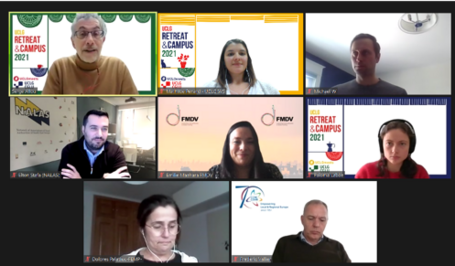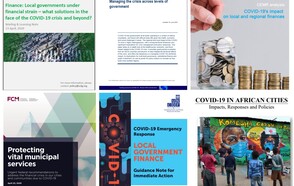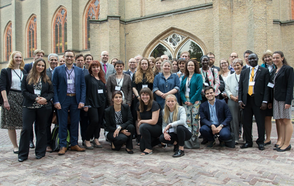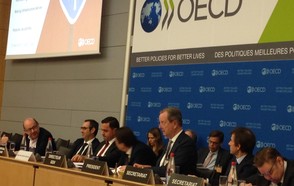
The UCLG Annual Retreat & Campus was a timely opportunity to assess the progress and challenges of the implementation of our ‘Strategy on Localising Financing for Sustainable Urbanisation and Territorial Development’, three years after its adoption by the UCLG Executive Bureau. A breakout session brought together key representatives of UCLG sections, members and partners on Wednesday 17th February to discuss the renewal of the Strategy and how to give it fresh impetus for greater impact.
The localisation of financing is a core priority of UCLG’s action agenda, which was formalised in 2018 with the adoption of a ‘Strategy on Localising Financing for Sustainable Urbanisation and Territorial Development’. This strategy is implemented in close collaboration with the FMDV around three main work streams: knowledge production on finance and multilevel governance systems through the OECD-UCLG World Observatory on Subnational Government Finance and Investment; advocacy at the national and international levels with the Malaga Global Coalition for Municipal Finance; and the setting-up of the International Municipal Investment Fund and its Technical Assistance Facility to facilitate local governments’ access to capital markets, in partnership with UNCDF.
The COVID-19 pandemic has increased the relevance and urgency of promoting the localisation of financing in the recovery by addressing market failures in the current financial architecture. To take up this challenge and position local and regional governments as pivotal players during the Decade of Action, UCLG with the support of the FMDV has prepared a proposal to renew and step up the strategy, drawing on the progress and challenges of its implementation over the last three years. This proposal was introduced and discussed in a dedicated session on Wednesday 17th February, as part of the UCLG Annual Retreat.
The breakout session opened with an overview of the main activities of our local finance agenda in 2020 given by Mathilde Penard, Local Finance Officer, UCLG, followed by a presentation of the renewed strategy by Emilie Maehara, Director of Programmes, FMDV. Emilie Maehara highlighted two main aspects to strengthen the localisation of financing towards 2030: the need to identify priority levers of action to increase local and regional governments’ access to finance and, to focus our advocacy efforts on promoting experience-based and actionable proposals in specific global agenda monitoring spaces.
“We are facing a market failure situation, where the many credit lines set up for urban and territorial development have not been disbursed, in spite of the recognition of the strategic role played by local and regional authorities in achieving the global agendas” Emilie Maehara, Director of Programmes, FMDV
 Following her presentation, substantive feedback was provided by François Yatta, Director of Programmes, UCLG Africa, Michael Wodzicki, Director of Strategies and Development, Federation of Canadian Municipalities (FCM) and Elton Stafa, Regional Fiscal Decentralisation Expert, Network of Associations of Local Authorities of South East Europe (NALAS). The three experts pointed out several topics to be further covered under the renewed strategy, including how to increase resource mobilisation and improve the quality of spending through capacity building and technical assistance, the need to engage in direct interaction with international financing institutions and to provide platforms for dialogue and exchange at the national level.
Following her presentation, substantive feedback was provided by François Yatta, Director of Programmes, UCLG Africa, Michael Wodzicki, Director of Strategies and Development, Federation of Canadian Municipalities (FCM) and Elton Stafa, Regional Fiscal Decentralisation Expert, Network of Associations of Local Authorities of South East Europe (NALAS). The three experts pointed out several topics to be further covered under the renewed strategy, including how to increase resource mobilisation and improve the quality of spending through capacity building and technical assistance, the need to engage in direct interaction with international financing institutions and to provide platforms for dialogue and exchange at the national level.
“There is a need to bridge the gap between local authorities and financial markets and to pool fundraising efforts in order to reduce the costs of access to finance” François Yatta, Director of Programmes, UCLG Africa
“Technical assistance is critical to support local government finances and their capacity to manage their expenses on a long-term basis. And it must be provided in the form of grants, not loans” Michael Wodzicki, Director of Strategies and Development, FCM
“It is important to create opportunities and spaces to foster these exchanges between local and national policy makers at the national level. Ministries of finance have a crucial role to play here” Elton Stafa, Regional Fiscal Decentralisation Expert, NALAS
Frédéric Vallier, Secretary General, CEMR, also pointed out the need to identify specific financial instruments suitable for intermediary cities and rural territories that can hardly access capital markets. Finally, a representative of Public Services International raised the issue of the role of blended finance in the financing of quality basic public services in light of the pandemic.
The valuable inputs provided during the breakout session will feed into the strengthening of our strategy on localising financing which, in turn, will inform our Pact for the Future. It’s now up to us to agree on a clear roadmap to advance this critical agenda in the coming months.
· Read the draft proposal on the renewal and stepping up of the UCLG Strategy on Localising Financing here.
· Check out the 2020 highlights of our local finance agenda here.
· Contact our UCLG local finance team at [email protected]













